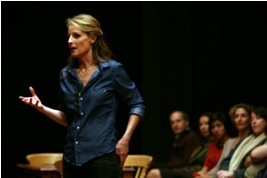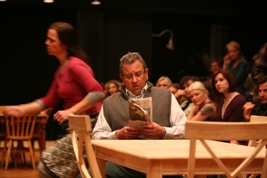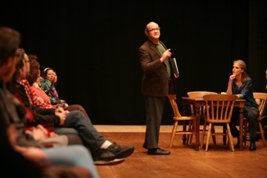
Rare is the theatergoer who has not seen at least one, if not half a dozen productions of Our Town, Thornton Wilder’s classic bit of Americana that first astonished audiences in 1938 with its innovative storytelling, even as it told a story as old as time itself—a story of birth, and life, and love, and death.
Since so many of us have been exposed to Our Town as early as our youngest school days (is there an American middle or high school that hasn’t staged Our Town?), there must be a special reason to see yet another production. The arrival of David Cromer’s acclaimed off-Broadway revival at the Broad Stage in Santa Monica offers ample reasons to take another stroll down the streets of Grover’s Corners circa 1901, the most noteworthy of which is the presence of the luminous Helen Hunt in the groundbreaking (for 1938) role of The Stage Manager.
Not that Our Town doesn’t offer ample pleasures simply for being what it is—classic American theater at its most powerful, thought-provoking, and potentially life changing.
You know the story by now. In Act One, entitled “Daily Life,” we spend a day in Grover’s Corners, New Hampshire, passing most of our time chez next-door neighbors the Gibbs and the Webbs, with a side trip to one of the town’s myriad churches for choir practice, along with some historical factoids dating back as far as prehistoric times.
Act Two, “Love And Marriage,” focuses on neighboring sweethearts George Gibbs and Emily Webb, whose prickly friendship turns to love and then marriage, despite both bride and groom’s wedding day cold feet.
“Death” is how playwright Wilder entitles Our Town’s surreal third act, with the deceased of Grover’s Corners, including a number of characters we’ve met in Acts One and Two, welcoming a still young Emily to their midst. Unable to reconcile herself to an afterlife without her loved ones, Emily asks for and is granted the chance to return to earth for a single day and re-experience the life she has lost.
Aside from the supernatural aspect of Act Three, Our Town might sound, at least on paper, like nothing all that out of the ordinary. But ordinary it is not, and one can only imagine how 1930s audiences must have reacted to Thornton Wilder’s then revolutionary storytelling techniques.
Taking his cue from the Ancients, Wilder has as his “Greek Chorus” a ubiquitous “Stage Manager,” who narrates Our Town without ever leaving the stage as he (or she) assumes several cameo roles, offers wry commentary on the action, and propels us backwards and forwards through time and space.
Add to this an almost total lack of scenic design, with only a few tables and chairs “for those who think they have to have scenery,” and virtually no props, Wilder having his actors mime everyday tasks, as when Mrs. Gibbs prepares breakfast for her two children without need of actual pots and pans.
Director Cromer, whose nearly 650-performance 2009 New York production proved the longest-running in Our Town’s history, takes Wilder’s artifices and amplifies them to the nth degree, seating the audience on both sides of a long, narrow, nearly empty stage (except for those tables and chairs on either end). Actors occasionally enter audience space, making us more than simply observers. House lights remain up throughout Grover’s Corners daylight hours, allowing (even forcing) us to see each other even as we focus on the “onstage” action. Characters are costumed in modern garb, exactly what you might see at any 2012 high school or shopping mall, and eschew any trace of regional accents, despite Wilder’s folksy New England dialog. At some point or other, Stage Manager Hunt is likely to be within spitting distance of just about anyone in the audience with the exception of the small number with a balcony view.
The result of all this, besides making this Our Town singular enough to attract our notice, is that unlike certain stodgier past productions, Cromer’s vision of Wilder’s takes us out of any specific era or locale, turning Grover’s Corners into whatever city or town we live in and its inhabitants into people we might well run into on a stroll down the block. As the Act Three dead sit among us and we among them, it’s hard to imagine anyone at the Broad not pausing to take stock of his or her own life.
Cromer has cast the majority of Our Town’s speaking roles with the East Coast-based actors who appeared in the New York production, though gratifyingly, a number of important supporting roles are played by L.A. theater regulars, including Scenie-winners Jeffrey Hutchinson (Joe Stoddard), David LM McIntyre (Professor Willard), and Daniel David Stewart (Wally Webb). There is truly not a weak link in the uniformly fine cast cast, whose principal members include Kati Brazda (Mrs. Webb), Tim Curtis (Editor Webb), Nathan Dane (Sam Craig), Nicholas R Grava (Si Crowell), Donna Jay Fulks (Mrs. Soames), Coby Getzug (Joe Crowell, Jr.), Jennifer Grace (Emily Webb), Matthew Kimbrough (Constable Warren), Ronete Levenson (Rebecca Gibbs), Jonathan Mastro (Simon Stimson), James McMenamin (George Gibbs), Lori Myers (Mrs. Gibb), Maximilian Osinski (Howie Newsome), and Jeff Still (Doc Gibbs). As for Hunt, the star of stage and screen is steely perfection in a performance that avoids the quaint and folksy, the better to create a character in which each of us can see ourselves reflected.
The rest of the huge supporting cast is made up of Dan Alemshah, Elizabeth Audley, Wayne Baldwin, Timothy Howard Davis, Jonathan Edwards, Lesley Fera, Kathy Forsman, Lisa Goodman, Dana Jacks, George Ketsios, Vallean Mann, Margaret Miller, Pamela Munro, Jonathan Palmer, Sheila Raznick, Vincent Selhorst-Jones, Gordon Wells, and Audrey Wishnick.
Music director Mastro not only portrays alcoholic choir director Simon Stimson but accompanies choir practice on piano and provides moody, effective original musical underscoring, though not before choir practice begins. At first I wondered whether Mastro might have arrived late on Opening Night, however I’ve been informed that it was Cromer’s intention that Act One have no music, no artifice, just a glimpse into ordinary conversation.
The contributions of scenic designer Stephen Dobay, lighting designer Heather Gilbert, and costume designer Alison Siple seem relatively slight until an Act Three surprise that proves so groundbreaking that this reviewer wishes he could reveal it here. Suffice it to say you have never seen this in an Our Town, and it may well take your breath away, as it did mine.
Amy M. Dalba is general management consultant, Richard A. Hodge production stage manager, Melissa Jernigan assistant stage manager, Michael Padden assistant director, and David Toledo technical director.
Helen Hunt up close and personal in Our Town gives this Broad Stage production Special Event status, but David Cromer’s stunning re-imagining of Thornton Wilder’s greatest play stands on its own, star leading lady or not. Though tickets are pricey, they are certain to be selling like hotcakes throughout the show’s limited run. And no wonder. This is one Our Town Angelinos will not want to miss.
The Broad Stage, 1310 11th Street, Santa Monica.
www.TheBroadStage.com
–Steven Stanley
January 18, 2012
Photos: Iris Schneider





 Since 2007, Steven Stanley's StageSceneLA.com has spotlighted the best in Southern California theater via reviews, interviews, and its annual StageSceneLA Scenies.
Since 2007, Steven Stanley's StageSceneLA.com has spotlighted the best in Southern California theater via reviews, interviews, and its annual StageSceneLA Scenies.







 COPYRIGHT 2024 STEVEN STANLEY :: DESIGN BY
COPYRIGHT 2024 STEVEN STANLEY :: DESIGN BY